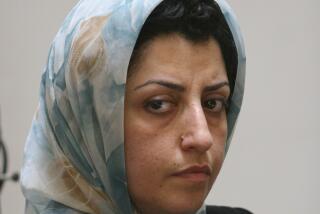Related story: Man behind Portland Christmas bomb plot apologizes, asks for mercy
- Share via
Mohamed Osman Mohamud once called for jihad against the West and said the attacks of Sept. 11 were “awesome.” The bomb he hoped would kill thousands, he said, was “beautiful.”
Now, he’s begging for mercy.
“My heart is filled with remorse, shame, sorrow, pain and misery every time I think about my actions on that day,” Mohamud wrote in a letter filed in federal court in Oregon and addressed to the judge who will sentence him.
“That day” Mohamud is referring to is Nov. 26, 2010, when he planned to set off a bomb at the crowded annual Christmas tree lighting in Portland’s Pioneer Courthouse Square.
But the 1,800-pound bomb that Mohamud tried to detonate remotely through a cellphone was fake, designed by federal investigators to resemble an actual explosive. The men Mohamud thought were Al Qaeda operatives were actually undercover officers.
In January, a jury convicted Mohamud, 22, of attempting to set off a weapon of mass destruction. He faces a sentence of up to life in prison. Prosecutors are requesting a sentence of 40 years, according to court documents. Defense attorneys are asking for 10 years in prison.
The fate of the Somali American from Beaverton, Ore., is in the hands of U.S. District Judge Garr M. King. Prosecutors are seeking a delay to the Sept. 6 sentencing date.
“I can’t change what happened,” Mohamud said as part of his apology in the undated letter, handwritten on loose-leaf paper and addressed directly to King.
“All I can do is try to make myself a better person and give back wherever I can.”
Defense attorneys say their client deserves a sentence closer to the minimum mandated by federal law, citing two psychiatric evaluations asserting that Mohamud poses no danger to society and has disavowed radical and violent interpretations of Islam, according to court documents.
Defense attorneys said Mohamud was entrapped by undercover federal investigators. Psychiatric evaluations, family members and lawyers for Mohamud said he was scarred by his parents’ divorce and suffered from drug and alcohol dependency, leaving him vulnerable to exploitation, according to court documents. Internal FBI memos show agents were aware that Mohamud was “manipulable.”
“For someone searching for identity, the characters created by the [federal] agents provided compelling affirmations and answers that would encourage the negative influences on Mr. Mohamud,” said Dr. J David Kinzie, a psychiatrist at Oregon Health and Science University, in a letter to the judge included in the defense’s sentencing memo.
But prosecutors, arguing for a longer sentence, dismissed accusations that government investigators entrapped Mohamud.
“[Mohamud] methodically and resolutely plotted to murder thousands of innocent people in the name of Islamic extremism,” prosecutors wrote, disagreeing that impulsiveness or substance abuse played a part.
Prosecutors pointed to his regular contributions to Al Qaeda’s English-language online magazine, Jihad Recollections, and the fact that investigators’ attempts to discourage Mohamud proved fruitless.
While defense attorneys portray Mohamud as confused, oscillating between extreme piety and the activities of typical college students like drinking and partying, prosecutors say this was “a carefully constructed double life.”
“[The plot] was chillingly conceived over a four-month period and has its roots in a mindset defendant embraced from the age of fifteen,” prosecutors wrote, adding that on the day of the incident, Mohamud needed no encouragement from his accomplices.
“He excitedly -- and repeatedly -- attempted to detonate the bomb,” prosecutors wrote.
ALSO:
Marchers return to Washington 50 years later
Bales gets life in prison without parole for Afghan killings
Georgia school-shooting hero meets 911 dispatcher: ‘We made it!
Twitter: @MattHjourno
More to Read
Sign up for Essential California
The most important California stories and recommendations in your inbox every morning.
You may occasionally receive promotional content from the Los Angeles Times.










